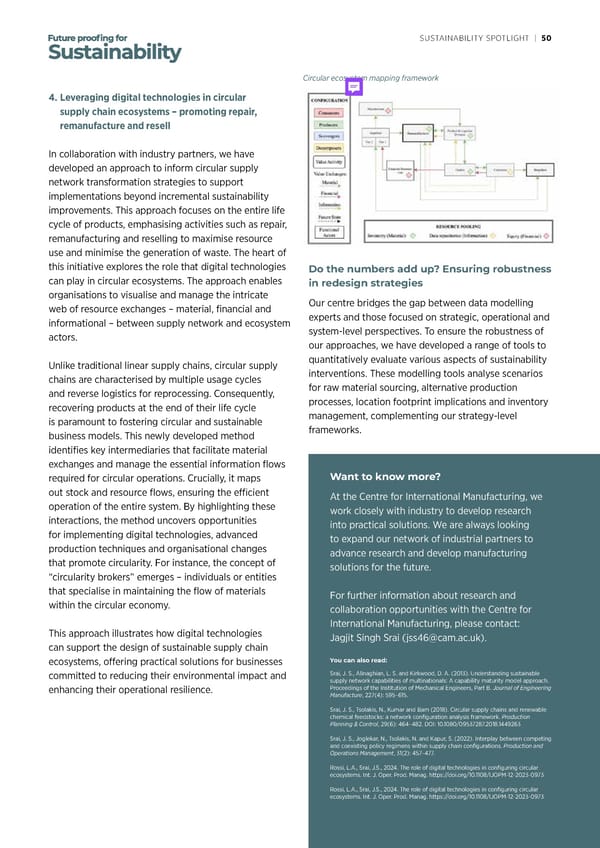SUSTAINABILITY SPOTLIGHT | 50 Circular ecosystem mapping framework 4. Leveraging digital technologies in circular supply chain ecosystems – promoting repair, remanufacture and resell In collaboration with industry partners, we have developed an approach to inform circular supply network transformation strategies to support implementations beyond incremental sustainability improvements. This approach focuses on the entire life IfM Engage partners with organisations across industry, government cycle of products, emphasising activities such as repair, and academia to support them in solving complex challenges, using remanufacturing and reselling to maximise resource approaches and knowledge developed at the IfM. IfM Engage o erings use and minimise the generation of waste. The heart of are grounded in exceptional research, combined with a breadth of this initiative explores the role that digital technologies Do the numbers add up? Ensuring robustness industrial expertise. can play in circular ecosystems. The approach enables in redesign strategies organisations to visualise and manage the intricate engage.ifm.eng.cam.ac.uk web of resource exchanges – material, financial and Our centre bridges the gap between data modelling informational – between supply network and ecosystem experts and those focused on strategic, operational and actors. system-level perspectives. To ensure the robustness of our approaches, we have developed a range of tools to Unlike traditional linear supply chains, circular supply quantitatively evaluate various aspects of sustainability chains are characterised by multiple usage cycles interventions. These modelling tools analyse scenarios and reverse logistics for reprocessing. Consequently, for raw material sourcing, alternative production recovering products at the end of their life cycle processes, location footprint implications and inventory management, complementing our strategy-level The Institute for Manufacturing (IfM) creates, develops and deploys is paramount to fostering circular and sustainable new insights into management, technology and policy. It strives to business models. This newly developed method frameworks. be the partner of choice for businesses and policymakers, as they identifies key intermediaries that facilitate material enhance manufacturing processes, systems and supply chains to deliver exchanges and manage the essential information flows sustainable economic growth through productivity and innovation. required for circular operations. Crucially, it maps Want to know more? out stock and resource flows, ensuring the e cient At the Centre for International Manufacturing, we ifm.eng.cam.ac.uk operation of the entire system. By highlighting these work closely with industry to develop research interactions, the method uncovers opportunities into practical solutions. We are always looking for implementing digital technologies, advanced to expand our network of industrial partners to production techniques and organisational changes advance research and develop manufacturing that promote circularity. For instance, the concept of solutions for the future. “circularity brokers” emerges – individuals or entities that specialise in maintaining the flow of materials For further information about research and within the circular economy. collaboration opportunities with the Centre for International Manufacturing, please contact: The University of Cambridge Department of Engineering is the largest This approach illustrates how digital technologies Jagjit Singh Srai ([email protected]). department at the University of Cambridge and one of the leading can support the design of sustainable supply chain centres of engineering in the world. The department’s aim is to address ecosystems, o ering practical solutions for businesses You can also read: the world’s most pressing challenges with science and technology. committed to reducing their environmental impact and Srai, J. S., Alinaghian, L. S. and Kirkwood, D. A. (2013). Understanding sustainable supply network capabilities of multinationals: A capability maturity model approach. enhancing their operational resilience. Proceedings of the Institution of Mechanical Engineers, Part B. Journal of Engineering eng.cam.ac.uk Manufacture, 227(4): 595–615. Srai, J. S., Tsolakis, N., Kumar and Bam (2018). Circular supply chains and renewable chemical feedstocks: a network configuration analysis framework. Production Planning & Control, 29(6): 464–482. DOI: 10.1080/09537287.2018.1449263 Srai, J. S., Joglekar, N., Tsolakis, N. and Kapur, S. (2022). Interplay between competing and coexisting policy regimens within supply chain configurations. Production and Operations Management, 31(2): 457–477. Rossi, L.A., Srai, J.S., 2024. The role of digital technologies in configuring circular ecosystems. Int. J. Oper. Prod. Manag. https://doi.org/10.1108/IJOPM-12-2023-0973 Rossi, L.A., Srai, J.S., 2024. The role of digital technologies in configuring circular ecosystems. Int. J. Oper. Prod. Manag. https://doi.org/10.1108/IJOPM-12-2023-0973
 Sustainability Spotlight Magazine Page 49 Page 51
Sustainability Spotlight Magazine Page 49 Page 51